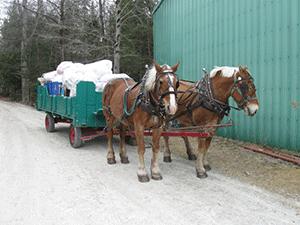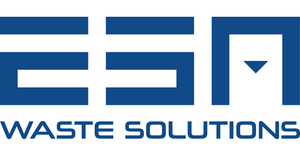A Welcome Whinny: Horse-Drawn Trash Collection Expands in Vermont
Earlier this month, Nick Hammond took the reins as the chief rubbish and recyclables collector in the central Vermont community of Middlebury. Literally.
The 28-year-old has guided his team of spotted draft horses on a pickup route around this bucolic college town of 8,500 twice weekly since April 1 after his business partner, Patrick Palmer, was granted a local commercial hauler’s license from the Addison County Solid Waste Management District.
Palmer, 68, is a carpenter who has operated a horse-drawn trash hauling business in nearby Bristol since 1998. A new state law that kicks in July 1 and requires garbage haulers to add recyclables to their repertoire prompted him to expand his equine experiment into Middlebury.
“One hauler there was doing trash and another the recycling,” Palmer told Waste360 in an interview. “I saw an opportunity to jump in and offer both services.”
Palmer, who counts on a pair of dapple-gray Percherons for horsepower, met Hammond at the local draft horse club. In addition to toting trash, their workhorses also tug logs from woodlots.
Addison County isn’t the only place where the clip-clop of shod hooves is welcome on trash day. Mackinac Island, the 8-square mile historic vacation destination on Lake Huron between Michigan’s mainland and its Upper Peninsula, deployed horse-drawn wagons in 1992 after the state Department of Environmental Quality opted to shutter the local landfill.
 Residents and businesses contract with private companies that own pairs of Belgians, Clydesdales and Percherons to cart their garbage, recyclables and compostables to the island’s solid waste facility, adjacent to the capped landfill. Trash and recyclables are shipped off the island via barge. Banana peels, coffee grounds, yard clippings, straw and horse manure are transformed into a valuable commodity—between 400 and 1,000 cubic yards of compost annually that are sold on the island.
Residents and businesses contract with private companies that own pairs of Belgians, Clydesdales and Percherons to cart their garbage, recyclables and compostables to the island’s solid waste facility, adjacent to the capped landfill. Trash and recyclables are shipped off the island via barge. Banana peels, coffee grounds, yard clippings, straw and horse manure are transformed into a valuable commodity—between 400 and 1,000 cubic yards of compost annually that are sold on the island.
“That threat of closure spurred our recycling and composting operations to grow,” Paul Wandrie, the facility manager, said in an interview. “The cost of shipping trash to a landfill off the island is just enormous.”
Mackinac has always had a robust horse culture, Wandrie says. The horse population grows from about 20 in the depths of winter to 600 or so when temperatures climb. Workhorses carry freight for islanders and saddle horses and horse-drawn carriages are draws for tourists.
“Anything that you would imagine a truck doing on the mainland our horses do for us,” Wandrie says, adding that the island banned “horseless carriages” in the 1890s. “Honestly, I’d prefer to smell the horses over the diesel of a vehicle. They don’t travel too quickly but they sure get the job done. Plus, they give us compost.”
For decades, Palmer used his teams of horses at Thornapple Farm to offer carriage and sleigh rides, and to pull moose from national forests during hunting season. He was initially inspired to explore the litter-critter route after reading a long-ago journal article about such an operation in Oregon. An opportunity opened in the late 1990s when the new town manager in Bristol made it clear he wanted his road crew dismissed from trash duty.
“I did it twice for free to see if I could, then I won a bid against three other competitors,” Palmer says.
He now picks up between 130 and 150 bags of trash weekly from residences in Bristol, as well as separate bags of recyclables, which he doesn’t track. Instead of delivering his wagonload to the local landfill, he turns it over to a hauler who handles the area’s commercial customers.
But he’s not alone.
Horse trainer Lynda Malzac helps him on the route, as does a 14-year-old neighbor boy, one of the interns Palmer has mentored in a school-to-work program he created. Another of his mentees, 20-year-old Amanda Morse, is part of Hammond’s pickup team in Middlebury. Palmer figures he has taught at least 25 locals how to drive a team of horses.
“Everybody can do all of the jobs,” Palmer explains, whether it’s driving, loading or scooping poop. “When it’s 20 below, you argue over who gets out of the driver’s seat. It has a cover but it’s open and you’re going to freeze to death if you’re just sitting there.
“My feeling is, there’s no such thing as a bad day, just poor preparation. The worst days are 90 degrees and muggy or when it’s cold and wet. Other than that, we love it.”
Palmer caught what he calls the horse bug years ago when he married Cathy, a horsewoman whose father was a farrier. He prefers a whinny and a neigh to the screak of internal combustion.
“For one thing, it’s fun,” he says. “And like Winston Churchill said, the outside of a horse is good for the inside of a man.”
About the Author(s)
You May Also Like


